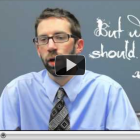Judge Steve Teske On The Road Less Traveled to Make Good Law for Kids
|
“What begins with anger ends with shame.”
Benjamin Franklin
I was asked this past week to visit the North Carolina General Assembly and speak to legislators about effective juvenile justice practices -- what works and what doesn’t work. Like Georgia and most states, North Carolina too was hit hard by the economy and is making hard decisions to cut programs — the state is 3.6 billion in the hole. The irony of budgeting in a fiscal crisis is that it forces policymakers to scrutinize the way things have always been done. When you have to cut, the question is what to cut and hopefully the less effective programs are cut and replaced by more effective and cost efficient alternatives. Our discussions in North Carolina focused on what works and what doesn’t work -- and typically what works is more cost effective. What doesn’t work is less effective and more expensive to the taxpayer --incarceration of kids in most circumstances is ineffective.








